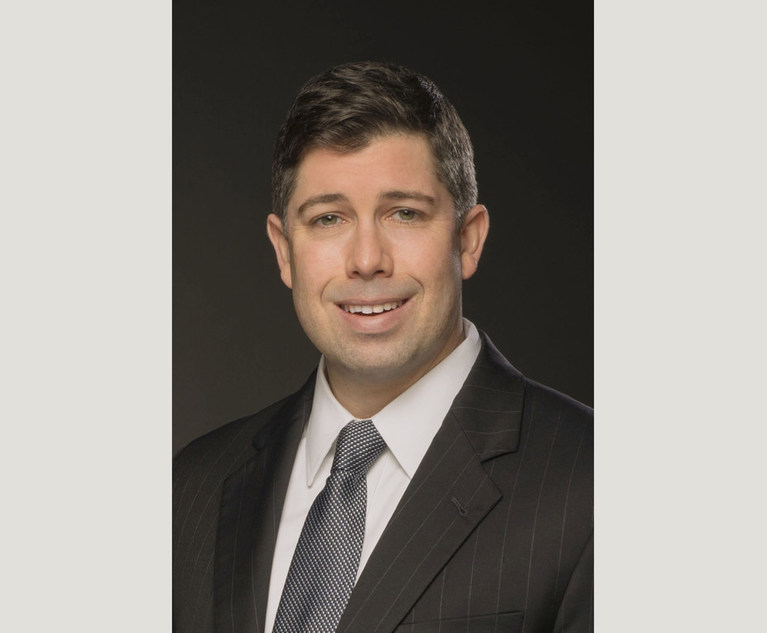 K. Tyler O'Connell of Morris James.
K. Tyler O'Connell of Morris James. In New AmerisourceBergen Decision, Chancery Applies 'Separate Accrual' Laches Analysis for 'Caremark' Red-Flags Claims
The Delaware Court of Chancery largely rejected arguments that laches barred fiduciary duty claims against AmerisourceBergen's directors and officers for acting in bad faith by disregarding red flags in safety reporting and monitoring systems and knowingly operating the business in a manner to violate positive law.
December 28, 2022 at 09:00 AM
6 minute read
ContributorsIn the latest Delaware corporate decision concerning AmerisourceBergen's role in the nation's opioid epidemic, the Delaware Court of Chancery largely rejected arguments that laches barred fiduciary duty claims against AmerisourceBergen's directors and officers for acting in bad faith by disregarding red flags in safety reporting and monitoring systems and knowingly operating the business in a manner to violate positive law. See Lebanon County Employees' Retirement Fund v. Collis, 2022 WL 17687848 (Del. Ch. Dec. 15, 2022). Addressing an issue of first impression, Vice Chancellor J. Travis Laster applied a "separate accrual" analysis, which regards "a series of related decisions and conscious nondecisions as a sequence of wrongful acts, each of which gives rise to a separate limitations period."
The Court of Chancery's Decision
AmerisourceBergen is one of the nation's largest opioid distributors, a middleman between manufacturers and pharmacies. It has faced many federal, state and local government investigations, enforcement actions and other lawsuits arising from its alleged business strategy of selling greater quantities of opioids to suspicious purchasers despite increasing legal risk. Previously the stockholder-plaintiffs sought books and records under 8 Del. C. Section 220 to investigate potential wrongdoing by the company's directors and stockholders, and ultimately prevailed before the Delaware Supreme Court. See Lebanon County Employees' Retirement Fund v. Collis. 2020 WL 132752 (Del. Ch. Jan. 13, 2020), aff'd, 243 A.3d 417 (Del. 2020).
This content has been archived. It is available through our partners, LexisNexis® and Bloomberg Law.
To view this content, please continue to their sites.
Not a Lexis Subscriber?
Subscribe Now
Not a Bloomberg Law Subscriber?
Subscribe Now
NOT FOR REPRINT
© 2025 ALM Global, LLC, All Rights Reserved. Request academic re-use from www.copyright.com. All other uses, submit a request to [email protected]. For more information visit Asset & Logo Licensing.
You Might Like
View All
Chancery: Common Stock Worthless in 'Jacobson v. Akademos' and Transaction Was Entirely Fair
5 minute read
The Importance of Contractual Language in Analyzing Post-Closing Earnout Disputes
6 minute read
Delaware Supreme Court Upholds Court of Chancery’s Refusal to Blue Pencil an Unreasonable Covenant Not to Compete
4 minute read
Chancery Stays Action Pending Resolution of a Motion to Dismiss in a First-Filed Action to Which the Defendant Is Not a Party
5 minute readLaw Firms Mentioned
Trending Stories
- 1We the People?
- 2New York-Based Skadden Team Joins White & Case Group in Mexico City for Citigroup Demerger
- 3No Two Wildfires Alike: Lawyers Take Different Legal Strategies in California
- 4Poop-Themed Dog Toy OK as Parody, but Still Tarnished Jack Daniel’s Brand, Court Says
- 5Meet the New President of NY's Association of Trial Court Jurists
Who Got The Work
J. Brugh Lower of Gibbons has entered an appearance for industrial equipment supplier Devco Corporation in a pending trademark infringement lawsuit. The suit, accusing the defendant of selling knock-off Graco products, was filed Dec. 18 in New Jersey District Court by Rivkin Radler on behalf of Graco Inc. and Graco Minnesota. The case, assigned to U.S. District Judge Zahid N. Quraishi, is 3:24-cv-11294, Graco Inc. et al v. Devco Corporation.
Who Got The Work
Rebecca Maller-Stein and Kent A. Yalowitz of Arnold & Porter Kaye Scholer have entered their appearances for Hanaco Venture Capital and its executives, Lior Prosor and David Frankel, in a pending securities lawsuit. The action, filed on Dec. 24 in New York Southern District Court by Zell, Aron & Co. on behalf of Goldeneye Advisors, accuses the defendants of negligently and fraudulently managing the plaintiff's $1 million investment. The case, assigned to U.S. District Judge Vernon S. Broderick, is 1:24-cv-09918, Goldeneye Advisors, LLC v. Hanaco Venture Capital, Ltd. et al.
Who Got The Work
Attorneys from A&O Shearman has stepped in as defense counsel for Toronto-Dominion Bank and other defendants in a pending securities class action. The suit, filed Dec. 11 in New York Southern District Court by Bleichmar Fonti & Auld, accuses the defendants of concealing the bank's 'pervasive' deficiencies in regards to its compliance with the Bank Secrecy Act and the quality of its anti-money laundering controls. The case, assigned to U.S. District Judge Arun Subramanian, is 1:24-cv-09445, Gonzalez v. The Toronto-Dominion Bank et al.
Who Got The Work
Crown Castle International, a Pennsylvania company providing shared communications infrastructure, has turned to Luke D. Wolf of Gordon Rees Scully Mansukhani to fend off a pending breach-of-contract lawsuit. The court action, filed Nov. 25 in Michigan Eastern District Court by Hooper Hathaway PC on behalf of The Town Residences LLC, accuses Crown Castle of failing to transfer approximately $30,000 in utility payments from T-Mobile in breach of a roof-top lease and assignment agreement. The case, assigned to U.S. District Judge Susan K. Declercq, is 2:24-cv-13131, The Town Residences LLC v. T-Mobile US, Inc. et al.
Who Got The Work
Wilfred P. Coronato and Daniel M. Schwartz of McCarter & English have stepped in as defense counsel to Electrolux Home Products Inc. in a pending product liability lawsuit. The court action, filed Nov. 26 in New York Eastern District Court by Poulos Lopiccolo PC and Nagel Rice LLP on behalf of David Stern, alleges that the defendant's refrigerators’ drawers and shelving repeatedly break and fall apart within months after purchase. The case, assigned to U.S. District Judge Joan M. Azrack, is 2:24-cv-08204, Stern v. Electrolux Home Products, Inc.
Featured Firms
Law Offices of Gary Martin Hays & Associates, P.C.
(470) 294-1674
Law Offices of Mark E. Salomone
(857) 444-6468
Smith & Hassler
(713) 739-1250






